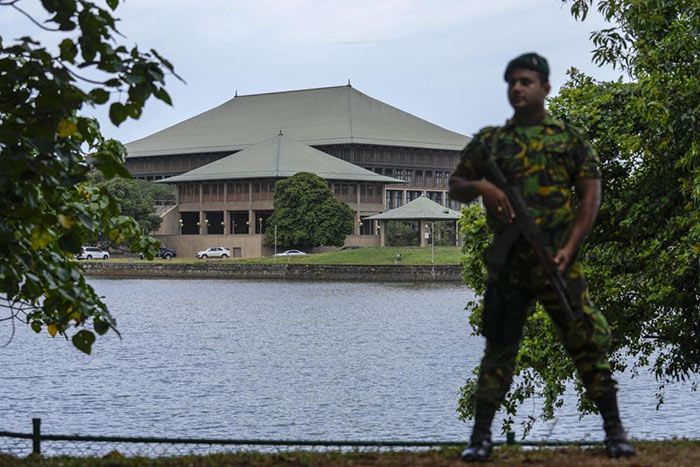Sri Lankan lawmakers debate bill to trim presidential powers

A Special Task Force soldier stands guard outside the parliament building in Colombo, Sri Lanka. (AP Photo / Rafiq Maqbool)
Sri Lankan lawmakers began debating a proposed constitutional amendment on Thursday that would trim the powers of the president, a key demand of protesters who are seeking political reforms and solutions to the country’s dire economic crisis.
The Indian Ocean country is effectively bankrupt. Severe shortages of essential imports such as fuel and medicine set off massive demonstrations that led to the resignations of the president, prime minister and key Cabinet ministers several months ago.
The protesters, including many students and activists, have been demanding reforms to ensure transparency and accountability.
Justice Minister Wijeyadasa Rajapakshe told Parliament that the proposed amendment would transfer some presidential powers, including the appointment of officials, to a constitutional council comprising lawmakers and respected non-politicians. The council would recommend candidates for appointment to the president.
Rajapakshe said the proposal would help ensure the independence of the judiciary and public service.
Under the proposed amendment, presidents could only appoint senior judges, attorney generals, central bank governors, police, election commissioners, and bribery and corruption investigators on the recommendation of the council. The prime minister would recommend Cabinet appointments, and the president would not be allowed to hold any Cabinet positions except defense.
The bill will be debated on Thursday and Friday and a vote will be held on Friday. It must be approved by two-thirds of the 225-member Parliament to become law.
Current President Ranil Wickremesinghe, who succeeded ousted President Gotabaya Rajapaksa in July, has promised to limit the powers of the presidency and strengthen Parliament.
If passed into law, the bill would reinstate many democratic reforms made in 2015. Rajapaksa reversed those reforms and concentrated power in the presidency after being elected in 2019.
The protesters blame Rajapaksa and his powerful family for years of mismanagement and corruption. Many remain skeptical of Wickremesinghe and accuse him of trying to protect the former leader and his relatives. Wickremesinghe was elected by Parliament to complete Rajapaksa’s term, which ends in 2024.
Sri Lanka has suspended repayments of nearly $7 billion in foreign debt due this year pending the outcome of talks with the International Monetary Fund on an economic rescue package. The country’s total foreign debt exceeds $51 billion, of which $28 billion has to be repaid by 2027.
(AP)

Latest Headlines in Sri Lanka
- Court of Appeal to rule on IGP Tennakoon’s arrest warrant on March 17, 2025 March 12, 2025
- Military deserter arrested for sexually assaulting doctor at Anuradhapura Hospital March 12, 2025
- Tuition teacher under investigation for student assault ignores NCPA summons March 12, 2025
- Sri Lanka maintains stance on Adani, open to investment March 12, 2025
- Doctors strike over delay in arrest of sexual assault suspect March 12, 2025


